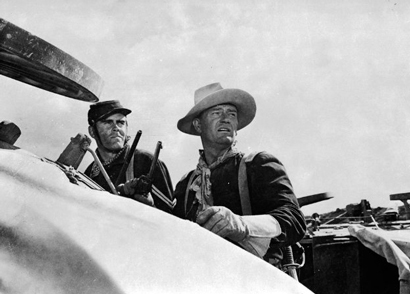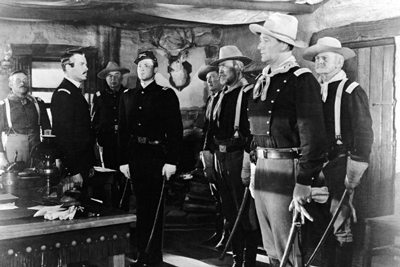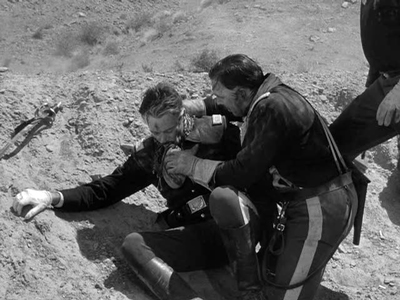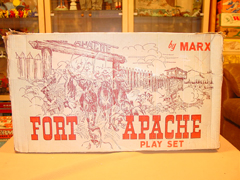
 |
|
|
|
Previous to his Navy duty in WW2, John Ford had made only one sound-era western. Although always associated with tales of adventure and history, his most notable pictures were highly artistic, sentimental stories (How Green Was My Valley, The Informer) and the socially conscious (some say leftist) The Grapes of Wrath. But everything changed after the war. Ford's pictures skewed more toward westerns with the superb My Darling Clementine, and military themes began to dominate his work. This may have been a personal choice or a commercial direction imposed by the marketplace, but for a few years John Ford's action films sung the praises of American military life and military tradition. Fort Apache is the Cavalry western, the template for everything from Major Dundee to F Troop. Writer Frank S. Nugent's ode to the U.S. Cavalry is an examination of the Custer legend through a filter that idealizes men in uniform. Ford's vision is historically sound and wholly honest about the contradictions of the Indian Wars: the "handling" of the Native American population is unjust and absurd, yet it formed the basis of a military tradition: An honorable Army built on a heritage of dishonorable duties. 
With a few changes, the story could be a colonial adventure set in Africa or India. Just as Cochise and Geronimo leave the reservation Lt. Col. Owen Thursday (Henry Fonda) is sent to 'the end of the Earth' to command Fort Apache. Thursday's daughter Philadelphia (Shirley Temple) finds a beau in newly minted Lt. O'Rourke (John Agar) while Owen alienates his command with his priggish attitude and refusal to yield to officers more experienced than he in Indian matters. Meanwhile, a quartet of Sergeants (Pedro Armendaríz, Victor McLaglen, Dick Foran and Jack Pennick) find ways to stay saturated with alcohol. Troop leader Capt. Kirby York (John Wayne) negotiates the Apaches' peaceful return to the reservation but Thursday refuses to recognize the Indians' rights or to grant them respect. He provokes an all-out battle that, thanks to his own incompetence, becomes a massacre. York carries on, falsifying Thursday's actions to bring glory and recognition to the Cavalry. In most but not all of his films about sailors and soldiers, John Ford promoted an idealized vision of military life that I fear few military men under the rank of Major would share. The enlisted men and non-commissioned officers tend to be infantile boozers, yet also dedicated troopers. A stable community of contented wives and dependents loves the Army even though they live under a secondary pecking order of privilege. Fort Apache's telling scene in this regard is when young Philadelphia goes to another officer's wife for help in setting up her quarters. Mrs. Collingwood (the beloved Anna Lee) is more than happy to help out, but "help" means calling the Sergeant's wife to "volunteer" to do the work. The Sergeant's wife and an equally "happy" Mexican servant (Movita from Mutiny on the Bounty) put Philadelphia's house in order for her. Being the daughter of the commanding officer, Philadelphia also must be welcomed when she appears unannounced and uninvited at any door in the community, something she does repeatedly. It's difficult not to resent Shirley Temple in this role, although she's just fine as Ford's 'perfect' daughter of the Officer Corps. That's an exaggeration, but it does point up the basic inequity in Ford's "idyllic" Cavalry community. Like all of his male groups, right up to the quasi-fantastic Elysium of Donovan's Reef, it's a heaven made for big boys who want to booze and brawl. In the real Army of 1948, petty differences -- both class- and ethnic-oriented -- were no joking matter. 
Ford's film is not the anti-Indian tract that many assume it to be. The director acknowledges the crimes of the Indian agent Meacham (Grant Withers), whom even Thursday detests. But Thursday understands nothing except his own agenda, transplanted from an interrupted military career back East. Like his obvious inspiration George Armstrong Custer, and his later incarnation Amos Charles Dundee, Thursday is looking for Glory, the magic career fix. "The Man who brought in Cochise," he mumbles to himself, as if mentally writing his own headlines. Thursday remains a mystery. Although he runs his command honestly (his attack on Cochise is sincere) he has the completely unrealistic notion that manic charges against unknown hostiles are a matter of pride and honor, not human lives. Sure, it's honorable for men to ride to their deaths without flinching ... if we're talking about the 17th or 18th century. Thursday is a prime candidate to get shot in the back by his own men, for the good of all. Fort Apache's acknowledgement of the tainted roots of military glory is almost schizophrenic. After two hours showing him to be a terrible detriment to the cavalry, Thursday's ignominious blunder is publicized as the corps' finest hour, an inspiration (and justification) for more Indian wars to come. We've just been shown otherwise, yet Ford presents the contradiction without irony: it just is. Thursday was a man of honor, and that's all that matters. Fort Apache is marvelous filmmaking for Ford. His formal visuals suit the quaint formality of the corps, and the awesome landscape of his Monument Valley provides the backdrop for history. The action scenes seem to be happening not in a desert but in some kind of historical never-never land of yesteryear, an America carved out of God's country where every hill looks like a stone cathedral. Ford shows his affinity for the ritual aspect of Army life -- the formality of greetings and farewells. The endless parades and formations are an opportunity for the individual soldiers to become a uniformed military unit, always at proud attention. Even the troop dances are dominated by parade-like prancing: look at us, we're noble warriors sworn to our duties. Even the drunken sergeants are part of the program: Service to the flag wipes out individual differences. The stars are great. Henry Fonda delivers an excellent martinet-prig in Thursday, a glum leader with nothing better to do than criticize his frontier fighters for not behaving like an honor guard back in the capitol. Just entering the best part of his career, John Wayne is extremely likeable and charismatic. What's more, it's very appealing to see him plead the case for a non-confrontational stance with the enemy. The most powerful scene sees Fonda insulting the Apache war chief through interpreter Pedro Armendariz, while Wayne can offer only futile protests. Frankly, it looks like a preview of American foreign policy for the next several decades. Fort Apache has appeal for hawks and sparrows alike. 
Ford drags generations of actors with him wherever he goes. Mae Marsh and George O'Brien come from the silent era and Wayne, Fonda, McLaglen, and Lee carry the accumulated baggage of their previous performances in Ford films. Jack Pennick has a big role, and Pedro Armendaríz is a welcome addition, apparently involved because of RKO's co-producing arrangements with Mexico. Shirley Temple and her husband John Agar are the anointed younger generation, raised in and nurtured by the Army. Interestingly, although Col. Thursday supposedly hates young Michael O'Rourke, he mercifully excludes him from his suicide charge. (Um... no. See this footnote.) Ford celebrates military glory, even as he acknowledges its blatant contradictions. 1 Warner Home Video's Blu-ray of Fort Apache looks fine, sharper and with better contrast than the previous DVD, of course. Why this particular show was chosen for Blu-ray is something of a quandary, as it isn't even in color. Perhaps the marketing statistics chose it as the most likely seller, or maybe somebody big in Warner Home video simply liked this title. The price is certainly attractive, a tactic the company has always favored. Laserdiscs routinely cost $40- $50 back in the early 1990s, but Warners' lasers were usually priced at $24.95. Repeating from the old DVD is a featurette about Monument Valley ("John Ford Country") and a theatrical trailer. Critic F.X. Feeney provides a commentary track.
On a scale of Excellent, Good, Fair, and Poor,
Fort Apache Blu-ray rates:

1. My prized possession at age 4 was a "Fort Apache" play set, a plastic fort with plenty of plastic soldiers fighting wild Indians. This was 1955 or 1956, when Sears sold Davy Crockett coonskin caps. But although buyers must have remembered the John Wayne-Henry Fonda movie, I don't think that a merchandising tie-in was part of the deal. 2. A welcome correction from Hank Graham, 3.04.12: Glenn: I think you missed a detail about Thursday's actions in Fort Apache. You wrote, "Interestingly, although Col. Thursday supposedly hates young Michael O'Rourke, he mercifully excludes him from his suicide charge." But that isn't what happened. He ordered York (Wayne) to send O'Rourke to him, meaning the young Michael O'Rourke, whose troop Thursday was using in his charge. Realizing that it was a suicide mission, Wayne tells this to the older O'Rourke (Ward Bond), who goes in his son's place. Both York and the older O'Rourke know just how bad an idea this charge is, and theirs is a quite intentional use of the ambiguity of Thursday's order--Thursday didn't specify which O'Rourke he meant. That is why the two of them look at each other for a moment when York passes the order on to Sergeant O'Rourke, and that is why Thursday looks so surprised when he sees the older O'Rourke, after the charge has failed. This may be clearer to someone with military experience. As the officer officially in charge of the troop Thursday was using, it should have been the young Michael O'Rourke who was with him.
Finally, I think you might get a kick out of my ruminations on the subject of Fort Apache in the context of how Hollywood has dealt with the subject of Custer, back when I wrote for HollywoodBitchSlap.com. Best, Hank
Reviews on the Savant main site have additional credits information and are often updated and annotated with reader input and graphics. Also, don't forget the 2011 Savant Wish List. T'was Ever Thus.
Review Staff | About DVD Talk | Newsletter Subscribe | Join DVD Talk Forum |
| ||||||||||||||||||